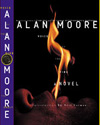
Comment
on this story
|
 |

Comic creator's novel ties events through time
by Lloyd Babbit
British writer Alan Moore has been writing lengthy, book-length fiction for decades, so it would be misleading to call Voice of the Fire (Top Shelf/$26.95) his debut novel. Yet, at least in terms of semantics, it is.
Moore began writing in the early '80s for the British comics magazine 2000AD. From there, he lent his words to the United States, crafting inventive and seminal work for D.C. Comics. It was there that he revamped the ailing Swamp Thing series. More important, though, was Watchmen.
Watchmen was and remains groundbreaking for many reasons. It was perhaps the first American comic to be conceived as a tale with both a beginning and an end, as opposed to a never-ending serial seeking to continue a franchise. Watchmen also reinvented notions of what comics could be. True, there were superheroes, long a staple of the medium. But instead of a simple tale of good versus evil, Watchmen was a kaleidoscope of Cold War nuclear tensions, political machinations, technological paranoia and hazy shades of morality.

As other comics creators copied Moore's ideas and dark tone, Moore himself ventured on to create other equally impressive work. There was the From Hell graphic novel, with a massive conspiracy theory linking Jack the Ripper, Freemasonry, and the English crown, The League of Extraordinary Gentlemen, a tour-de-force adventure story uniting characters from Victorian literature in a team of "superheroes," and Lost Girls, a yet-to-be-released erotic fantasy tryst of women from Oz, Wonderland and Neverland.
In between these ventures—in 1995 to be precise—Moore's first prose novel was released. Issued only in his own country, Voice of the Fire has driven many a U.S. fan mad with envy. Fortunately, that madness has ended.
Voice of the Fire finds its way to American audiences this month. Not surprisingly, it is well worth the wait.
Voice is a series of 12 interconnected stories spanning nearly 6,000 years of human history. Each of the tales takes place within a 10-mile stretch of land near Moore's home of Northampton. The stories blend witchcraft, savagery, subjectivity, and the darkness that lies within each of us. The resulting narrative is a meditation on the twisting annals of history, the supernatural world between life and death, and the oft-thin line between fantasy and reality.
Moore begins the work by introducing us to a half-witted Stone Age boy whose mother has recently died from infection. The boy is abandoned by his companions and forced to hunt and gather on his own. Soon he encounters a beautiful, mysterious woman. She hides him from her mate and feeds him until he can recover from his own injured leg. The boy soon finds himself falling in love and asks the woman to run away with him. She agrees. But before the two can escape, the boy finds himself the recipient of an act of primitive violence, teaching him a lesson he won't soon forget.
From there Moore leads us down dank pathways cemented with cobblestones of spilt blood, savage love, shamanism and historical revision. We meet several more characters, all displaced by time, yet utterly connected by the land beneath them.
There are two witches—lovers—revered at first by villagers, until they draw the wrath of jealous women and are burned at the stake. There is an estranged fisherman who believes he has somehow evolved into a terrifying new species. There is an investigator from Rome hot on the trail of a counterfeiting ring, feared and hated by the townsfolk until he learns a dark secret about the empire he loves. Then there is a peasant-turned-nun, voluntarily flogged to death for her devilish visions. Finally, Moore himself enters the picture, breaking the fourth wall in the present to reveal the invisible threads behind his tapestry of myth and mayhem.
Each tale reveals the progress and regress of history. We see the rise and fall of Rome, the beginnings of Christianity, the Crusades, the Civil War, the Industrial Revolution, and so on, each told from a very different voice lost somewhere in the scattered ashes of time. Along the way, we are treated to a bizarre consistency, one of bloated, severed heads, raging fires, arcane angelic language and hulking black dogs. It is a consistency in which certain ideas, themes, images, and even narrators return again and again. What these narrators have to tell us both shocks and comforts. It is in equal parts brutal and fair, hopeful and depressing.
In the end, we are left with a powerful wrap of emotions, ones that brings despair and lifts us above our petty carnal repetitions. Moore is convinced that somewhere, something has gone dreadfully wrong with humanity. Our history is one of broken dreams, evil alliances, and heartbreaking anguish. Moore offers few answers to the questions he raises, and an even smaller glimpse at the possibility of redemption. That, it would seem, he leaves up to us.

January 15, 2003 * Vol. 14, No. 3
© 2004 Metro Pulse
|